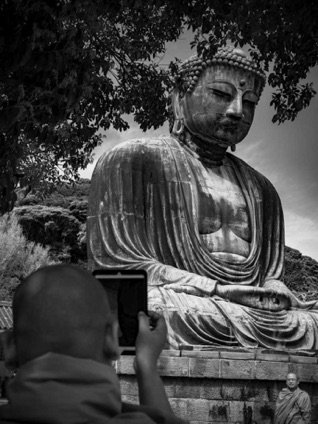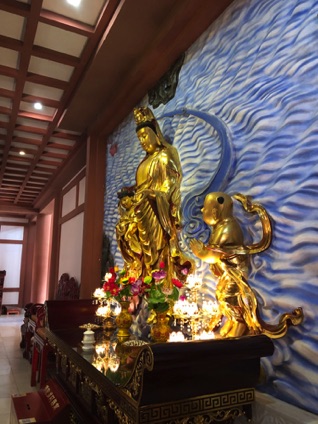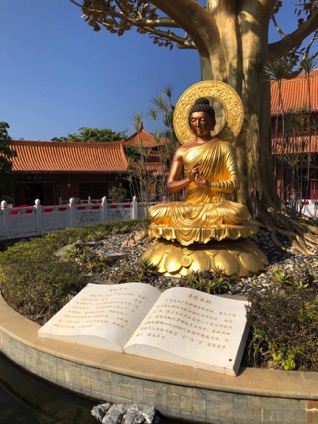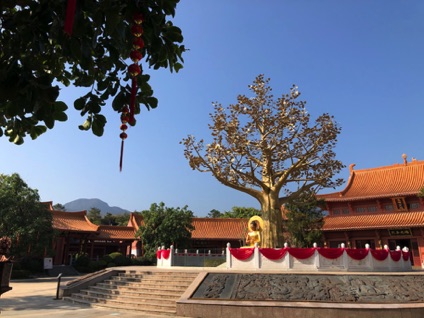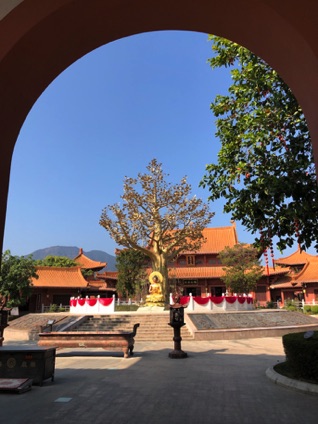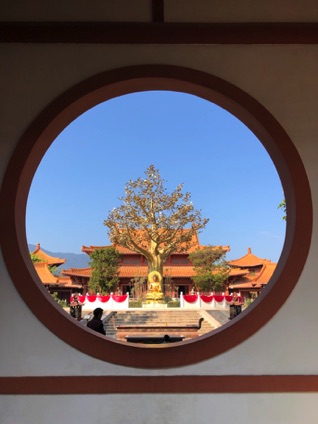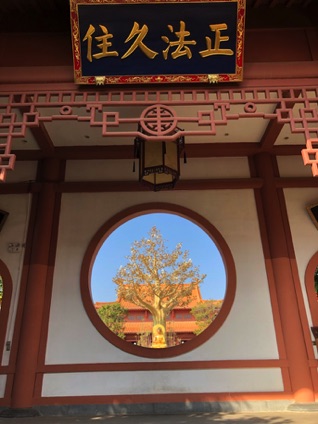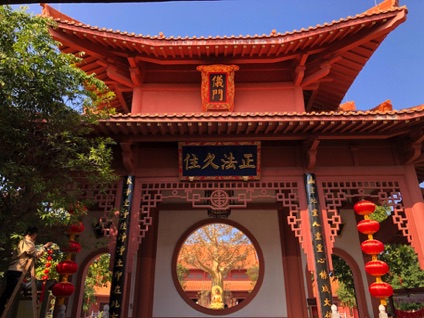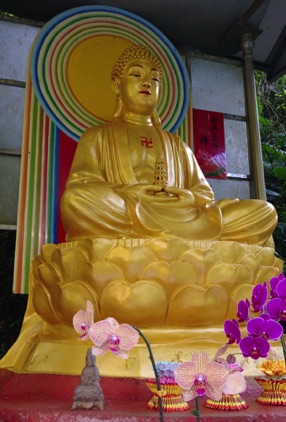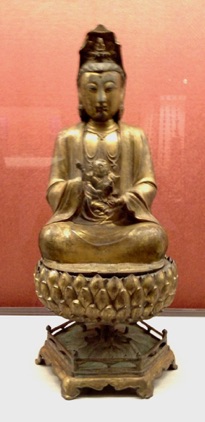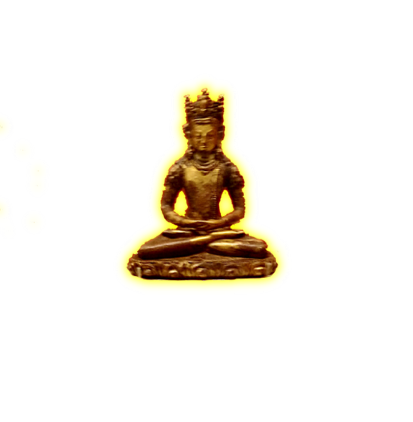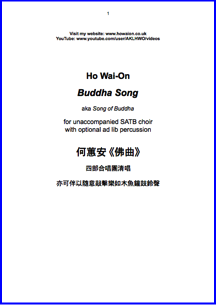I REMEMBER HONG KONG page 2 我記得香港之二
Buddha Song 佛曲
STORIES, MUSIC VIDEO, SCORE & IMAGES 故事、音樂視頻、樂譜和靚相
Scroll down to end for BUDDHA SONG video/score/comments
《佛曲》音樂視頻/樂譜/評語在頁尾
The only religion I know is Christianity and I have limited let alone in depth knowledge of any other religion. Yet I found some Buddhist verses uplifting, especially when I was in turmoil. As a child in Hong Kong, I noticed the influence of Buddhism, especially amongst the lower classes, which I was familiar with as I lived amongst them. However, I noticed these people were not interested in religious doctrine. They were secular and wished that a mixture of Buddhist and Taoist deity (as shown in local popular stories, Cantonese opera dramas and Hong Kong Cantonese films) to bless them with good living and happiness ― perhaps a little akin to worshiping gods in ancient Greece and Rome. Buddhism, though it originated in India, has influenced China, Korea, Japan and Southeast Asia, and evolved with local cultures. In Hong Kong, Buddhist monks and nuns shaved their heads, and must practise celibacy and veganism. Yet in many novels, including Hong Kong martial arts novels that I have read, Buddhist monks have been portrayed as licentious, and even eating dog meat (illegal in Hong Kong), yet on the other extreme some have reached the wisdom of forsaking all desires, and their sayings enlightened those who are still in the 'Bitter Sea (worldly sufferings)'. I suppose this is all due to good and bad of human natures rather than a particular religion. There are many interesting incidents/stories that I have experienced or heard, and I will gradually add these onto this page. The fact is, one can see the influence of Buddhism in literature, in architecture and in art...
我唯一有認識的宗教是基督教,對其他的宗教認知有限。但在迷惘痛苦的時刻,有些佛偈頗能指點迷津。小時候在香港,在我生活的環境中,感受到佛教對草根階層的影響,這些人對教義不感興趣,他們是世俗的,希望佛教道教的神靈保祐,有求必應,使他們生活美好,有點像古希臘和羅馬拜很多神祈福那樣。我對這些混合佛道的神祗的認識,來自連環圖、聽大人講故事、通俗小說、大戲和唐片(粵劇和粵語電影)。佛教雖源於印度,但影響及於中國、韓國、日本和東南亞,佛教亦受到當地文化的影響有所演變。在香港,僧尼都光頭,禁慾吃素,然而在許多小說中,包括我讀過的香港武術小說,都有淫僧和狗肉和尚的描寫(在香港吃狗是犯法的),但每讀到講高僧的,又令我十分神往,高僧一言,能令人脫苦海大澈大悟。我想人性的好與壞,不限於任何宗教吧。無何致疑地,佛教影響文學、建築和藝術。我將在此頁逐漸添加與佛教有關的見聞和趣事。
I wrote Buddha Song many years ago as inspired by what I remember of monks/nuns chanting the name of Buddha, and a song about a Buddhist monk I vaguely remember. The music video Buddha Song at the end of this page is Michael Proctor conducting the RAM choir, me playing percussion, and with images modified from photos of Buddha taken by my friend Kitty Kwan at Leshan Giant Buddha, Dazu Rock Carvings and Longmen Grottoes. I know Kitty from our school days at Hong Kong True Light Middle School.
多年前我作《佛曲》,靈感來自小時在香港聽到僧尼誦佛,和小學時唱過目連僧。我用此曲的錄音(英國皇家音樂學院合唱團唱,我敲木魚)製造音樂視頻,形象取材和修改自真光同學兼老友關伯瑋影的樂山大佛, 大足石刻和龍門石窟。
In the following I share some photos taken by people I know, of Buddha and temples that they took in various parts of the world reflecting Buddhism merging with different cultures: CLICK EACH IMAGE TO ENLARGE
以下分享一些我認識的人在世界各地拍攝與佛有關的相,反映佛教與不同文化的融合:點擊每個圖像放大
Juliet Chenery-Robson
Juliet is an accomplished photographer — see more of her excellent photos in my music video "Wisdom and Love". The following are photos of the well known Kamakura Buddha in Japan and how people try to capture and pose before it. After that there are some cute Buddhas, and then various forms of Buddha.
朱麗葉.陳奈尼-羅布森是出色的攝影家,我的音樂視頻《智慧與愛》有更多她的靚相。以下是她影的日本鎌倉大佛,和尚和學生擺姿勢打卡,可愛佛和各種佛。
BUDDHA SONG music video is placed at the end of this page, together with the score, comments and relevant/ interesting info.
《佛曲》音樂視頻連同樂譜,評語及相關故事和資料都在頁尾
Mr Leung 梁熾衡
Mr. Chee-Hang Leung was a member of staff at the True Light Middle School of Hong Kong who remains very connected with alumni of the school. He travels a lot and likes to take photographs. I have modified one of his photos in my "Four Songs in Chinese" music video. The following photos were taken in Burma and China. Click each photo to enlarge
梁生曾是香港真光中學的教職員,與校友們密切聯繫,經常旅行,喜歡拍照。我在《聯篇曲》音樂視頻用過一張他的蓮花靚相。以下照片是梁生在緬甸和中國影的,還有很多,整理後再上傳以供欣賞。点击圖片放大
Choy May-Chu 蔡美珠
May-Chu and I were classmates for six years at the True Light Middle School of Hong Kong. I spent about a year to modify/animate her beautiful paintings and photos in "Four Songs in Chinese" – a playlist of six music videos. She is now living in Taiwan and the following photos were taken there.
我和美珠在香港真光中學做了六年同學。我花了大約一年時間用她的靚畫靚相製造《聯篇曲》,是一系列的六個音樂視頻“。她現居台灣,以下在台灣拍攝。
Stories related to Buddhism 與佛教有關的見聞和趣事
I remember when I was a child in Hong Kong, those who gambled and were superstitious would plead to any deity for a win, and disliked seeing Buddhist monks/nuns because of their shaved heads (baldness signifies losing everything). They might even say rude things when seeing a bald-headed monk/nun, and some Buddhist monks/nuns would wear hats to cover their baldness. I once saw a hatless Buddhist nun choosing combs at Daimaru (a top Japanese department store at the time), which puzzled me. I thought Buddhist monks/nuns are supposed to give up worldly things, yet she spent time looking at all sorts of expensive worldly goods. Also, what's the point of buying a comb with a shaved head? If this was meant to be a gift, a Buddhist monk/nun is to sever worldly connection and hair symbolises worldly worries (hence shaving their heads), so why choose a comb to give away, and to whom?
我記得小時候,頗有香港人好賭迷信,求神拜佛求贏錢,忌見光頭和尚尼姑,見到會說無禮話,有些和尚尼姑外出也帶僧帽尼姑帽,蓋住光頭,免惹人厭,但我曾在香港大丸百貨公司,見到不帶帽的光頭尼姑買梳,令我大惑不解,了卻凡心才出家吧,却去看花花世界的百貨還要選購梳子,光頭要梳何用?難道買來送人?出家人了卻塵緣,為何買梳送人梳理三千煩惱絲呢?
At that time, not everyone would wait in line for a bus. At peak hours, when the bus came people would scramble trying to get on. Once, while waiting for a bus, I saw a Buddhist monk also waiting. I often heard that Buddhist monks do not vie with the world. Yet when the bus came, he pushed me aside to get on.
那時搭巴士(乘公共汽車)並不是人人都會守秩序排隊上車的,在交通擠擁的時間,巴士來時等車的人會爭先恐後擠擁上車,慢點便上不到,有次放學後在等巴士,見有位大和尚也在等,常聽說出家人與世無爭,怎知巴士來到,大和尚一掌把我推開他先上。
I once went to Putuoshan, a famous Buddhist scenic spot in Zhejiang. At a thriving Buddhist temple, I saw a monk swatting flies that were attracted by the food at the alter, yet "Thou shall not kill" is probably the first commandment in Buddhism. I was also amused as "swatting flies" means no business in Cantonese and not propitious to this thriving temple. I supposed that I had assumptions, and Buddhist monks/nuns are just humans like you and me.
曾到浙江普陀山一遊,這佛教名山的寺院香火盛,見到有和尚在拍殺那些被善男信女的供品食物惹來的蒼蠅,基督教有十誡,我不知道佛教有多少誡,但我想不殺生如果不是第一戒也是第二的了,而且廣東話"拍烏蠅"是沒有生意的意思,不吉利。大概我對出家人有假設理想,其實和尚尼姑也和你我一樣是凡人。
It puzzled me that the legendary Ji Gong, the living Buddha, is often depicted as drunk and a gluttony of meat when Buddhist monks/nuns are compulsory vegans. Some Buddhists said that's because of Ji Gong had said reincarnated prayer, and some said that the wine/meat had bypassed him. However, I was not convinced.
更不明白的是,濟公活佛常常大酒大肉,酒也罷了,但出家人茹素不食葷腥,吃肉犯大戒呀,信佛的說濟公已念經超生,或說酒肉穿腸過,我總覺得這些解釋玄而又玄,對我來說沒有説服力。
When I was in middle school, a teacher said that Buddhism enlightened people in varied ways according to their limitations, hence the two ways of comprehending Buddhism, namely Mahayana and Hinayana. His explanation of Mahayana and Hinayana differs from references I have come across. Perhaps his perception is also affected by his limitations. As humans, we are limited in understanding Mahayana and Hinayana, or in any religion and in God. We are like the fable of five blind men touching the elephant, each can only touch a certain part yet insists that's the only truth, while the fact is, they are incapable of seeing, let alone seeing the whole. I think that if your faith makes you compassionate, do some good to the world and not waste your life, that is best. If you feel peace and happiness because of your faith, that's good too.
中學時聽老師說,佛教渡人因人而異,因人的局限而有大乘小乘,他對大乘小乘的解釋,和我後來看到關於這方面的資料,不很一樣,大概他也是有局限吧。所以世人對佛不止有大乘小乘,對各種宗教的領悟亦各異,人的局限是不可能完全知道神的,不過如瞎子摸象,靠摸索到的局部來各執己見,其實並無能力觀看到全部,我想無論何種信仰,能令人慈悲為懷,做益世界不枉一生,那就最好,若能令個人心安理得,感到平安喜悅,這也很好。
The only religion I know a little about is Christianity. I have read the Bible many times, but I feel enlightened by some Buddhist texts, like the well-known quote on love (see David 8, Love & Buddhist Text), though my late friend the writer John David Morley thought it was penned by a jaded monk who had not loved. I also like reading old Chinese translations of Sanskrit Buddhist scriptures. I read about the crown prince Sudana (one of the previous lives of Buddha), who gave his wife and children to people he knew would abuse them. I was angry - how could he, in order to achieve nirvana, abandon a young woman and their young children who needed his love and protection, and subjected helpless and innocent children to abuse? It's too selfish. Yet my old friend Malcolm Singer (composer/conductor) said, "There is nothing difficult to understand - he must achieve that state before he could save his wife and children." In order to delve deeper into this I used it as an inspiration and started working on "Crown Prince Su-Da-Na" as an opera. When I was diagnosed with cancer for the second time, I needed major surgery and was afraid. To take my mind off gruesome surgery, I completed the prelude of "Crown Prince Su-Da-Na" scored for symphony orchestra in a short time. Of course, an uncommissioned work on such a large scale is almost impossible to get performed. An opera without an opera house commission will have even less chance to get performed. So, after writing the prelude, I put the creation of "Crown Prince Su-Da-Na"on hold.
我唯一有點認識的宗教是基督教,看過多遍的是聖經,但有些佛偈令我感到如當頭棒喝,譬如:"由愛故生憂...",但亡友大偉却認為那是從來沒有愛情的僧人寫的(參閱大偉與我,和愛與佛偈),我也喜歡讀那些梵文佛經故事,多是四字一句的譯本,但讀到太子須大拏(佛的前身)把妻及二子捨與明知是會虐待他們的人,我感到忿怒,為了達到自己的理想,捨棄需要他愛䕶的女人和年幼子女,尤其是令無助無辜的兒童被虐待,太自私了。老友馬勤.勝家(作曲家和指揮)説:"有什麼好不明白的,他要先得救再去救妻兒嘛。"由於不明白,便以此為創作靈感的動力,開始籌劃創作《太子須大拏》歌劇,我第二次癌症時需要接受大手術,等手術排期時又慌又怕,為了不去想有關手術的事,便迅速地寫了《太子須大拏》歌劇的前奏曲,當然,這沒有被委托就寫的交響樂作品,是幾乎沒有可能有演出機會的,沒有被歌劇院委托而寫的歌劇,就更沒有演出的機會了,所以我在寫了前奏曲後,便把《太子須大拏》歌劇的創作擱置了。
There are many music pieces to some extent were inspired by or related to Buddhism, such as: Debussy's Estampes - Pagodas (Oriental Buddhist temple of Indonesian and gamelan music); Britten's Curlew River – a parable for church performance in the style of Noh theatre, with a Buddhist abbot... I think all religions inspire artistic creativity. Creativity is a gift from God.
有頗多音樂作品是受到佛教感染的,例如:德彪西的《版畫-佛塔》表達印尼佛塔和加麥蘭音樂;布瑞頓有能劇風格的宗教寓言劇《麻鷸河》有一位佛教住持的角色。創作力是天賦的,所有的宗教都能激發藝術的創作。
BUDDHA SONG video《佛曲》視頻
The video/score/comments/related info/stories
(Scroll up for more stories and many photos)
視頻/樂譜/評語/相關資料和故事
(向上滾動有更多故事和很多靚相)
Relevant Stories/Info 相關故事和資料
The music was inspired by what I heard as a child in Hong Kong of Buddhist monks and nuns chanting Buddha i.e. 'nam-mor-or-mi-tor-fo' repeatedly, and a song about a monk that I vaguely remember. Quite often the chanting would be accompanied by percussive hits on wooden-fish (sounds like wood block). Instruments used in a Buddhist chant can include wooden fish, cloud-plate (a flat gong), a standing (bowl-shaped) bell, drums, small cymbals... I wrote this for music performance and the piece can be performed by an unaccompanied choir, or if so wished, with ad lib percussion, using percussion of similar sound to those mentioned above. The main rhythmic pattern is that of a regular pulse. For reference, listen to Buddhist chants on YouTube. Since this is music, be inventive with the ad lib percussion.
作的曲靈感來自小時在香港聽到僧人誦"南無阿彌陀佛"和唱過目蓮救母。誦佛可以清誦,或邊誦邊敲擊木魚,或再加上鐘、鼓、磬、雲板和鈴等等,我這曲是音樂作品,可以由合唱團無伴奏清唱,或隨意加上類似上述的敲擊樂,可聽聽一些網上的佛頌作參考, 只供參考而矣,無需跟足,敲擊如隨意即興最好。
I wrote Buddha Song (called Song of Buddha then) when I was a student at the Royal Academy of Music for a competition. The adjudicator was Ruth Gipps. She did not choose my piece but commented disapprovingly on lack of harmony in the 'nam-mor-or-mi-tor-fo' chanting. She liked the song (the 'Ah — ' section) towards the end better as having some sense of harmony, suggesting that's the way I should write composition from then on. I am almost certain she had never heard a Buddhist chant. Whenever I wrote anything using harmony as taught at the RAM, I regarded that as an exercise. I almost never really use "Western harmony" in my compositions.
我在皇家音樂學院做學生時作《佛曲》參加比賽,裁判是英國女作曲家露芙·吉普斯。她沒有選我的作品,批評佛誦(南無阿彌陀佛)缺乏和聲,但後來唱"阿——"歌的部份,因有和聲感而較佳,認為和聲是我作曲應改進的地方,我想,她是從未聽過佛誦的。我幾乎從來沒有真正地使用“西方和聲”來作曲,每當我用在皇家音樂學院學的西方和聲來寫點什麼時,我覺得我不過是在做習作。
I later came across an article by Ruth Gipps. I vaguely remember she was disapproving of Stravinsky because what he wrote did not quite fit her concept of "from God". I rather worship Stravinsky – so inventive and groundbreaking. I believe that creativity is a gift from God, but it's not for us to judge whether another person's creativity is from God or not. I also believe that I don't write compositions that would do well in competitions.
我看过一篇露芙·吉普斯寫的,她批評作曲家史特拉文斯基,認為他的作品與她認為“音樂來自上帝”的概念不符。我頗崇拜史特拉文斯基,他多麼有創造力和突破性。我相信創作天賦,但覺得不應判斷別人的作品是否來自上帝,而我的作曲方式想是不宜参加比賽的。
One day, at the Royal Academy, Michael Procter told me he came across my piece in the library, and used it as sight-reading exercise for the RAM choir he conducted. This is the recording I used to make this music video. I was impressed by the choir as it is not easy to sight read this piece – the chanting keeps modulating to unexpected keys and without instrumental support, yet they got everything right.
有一天,在皇家音樂學院,米高·普羅克特和我説,他在圖書館見到我作的《佛曲》,將其用作合唱團的視唱練習,我就是用這個錄音來製作音樂視頻的。合唱團真了不起,此曲佛誦部分是不停地作意想不到的轉調,又沒有樂器伴奏來支持音準,但合唱團一切都唱得非常準確。
Scroll up to top of page for more stories and many photos
向上滾動從頁頂看更多故事和很多靚相
Click the above for Buddha Song score in PDF format
點擊以上進入
《佛曲》樂譜
A music video by Ho Wai-On
Michael Proctor conducts the RAM choir, Ho Wai-On plays percussion
Images modified from Kitty Kwan photos taken at Leshan Giant Buddha,
Dazu Rock Carvings, Longmen Grottoes, Luoyang and southwest China.
Scroll down for comments, score, relevant stories/info
《佛曲》,何蕙安作曲、視頻製作和敲木魚,米高·普羅克特指揮英國皇家音樂學院合唱團,形象取材和修改自真光同學兼老友關伯瑋在樂山大佛、大足石刻、龍門石窟、洛陽和中國西南影的靚相。樂譜,評語,相關故事和資料見以下。
Use the following links if streaming of the above video is slow
若視頻卡慢可用以下鏈接看
YouTube link: https://youtu.be/6wyX9rAxoLE
Vimeo link: https://vimeo.com/486366839
Buddha Song comments 《佛曲》評語
"That was very calming, and charming! It reminded me a bit of monastic Gregorian Chant in Latin, though I understand some of the words in that." — Reverend Sue Wise
“很迷人和令人感到平靜!使我想起了修道院用拉丁文唱的格里高利頌歌,然而那些歌詞有些我是聽得懂的。" —蘇懷思牧師
Ho Wai-On: "The music was inspired by the sound of Hong Kong that I remember as a child, which includes plainchants similar to Gregorian Chant in Catholic Latin mass. When I was composing Buddha Song I thought that the chanting of the name of Buddha 'Nam-Mor-Or-Mi-Tor-Fu' sounded like Latin. "
何蕙安:"作曲的靈感來自我小時候在香港聽到的,(除了佛誦)這包括了天主教拉丁彌撒唱的類似格里高利頌歌的單聲聖歌。我在作《佛曲》時,亦覺得"南無阿彌陀佛"的英文音譯聽起來像拉丁文。"
"Just listened to your Buddha Song - love the percussive element which is not predictable."
— Vivien Finch, music amateur, teacher, memoir writer and London JP... and canine charities worker
“剛聽了您的《佛曲》,喜歡那變幻莫測的打擊樂。” —維維安·芬奇,音樂愛好者,教師,回憶錄作家和倫敦地方執法官...犬慈善工作者。
" I watched and listened to your Buddha Song yesterday evening and I thought that it was a great work. Well done. I’m getting to be a fan of monks chants and together with the fantastic photos of the rock carvings, it made for a lovely video." — Stuart Fleming, Wickford Wildlife Society
“昨晚我看了您的《佛曲》,這個做得很好,令我成為聽僧侶誦佛的粉絲,這音樂、石刻和靚相結合成為一精彩的視頻。” —史超域.弗來明,威克福德野生動植物學會
Relevant Stories/Info 相關故事和資料
Top: No percussion
